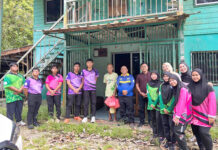DAMARAN BARU (AP) – In a lush jungle at the foothills of a volcano in Indonesia’s Aceh province, the song of gibbons in the trees mixes with the laughter of the seven forest rangers trekking below them. An hour into their patrol, the rangers spot another mammal in the forest with them.
“Where are you going? What are you doing?” they pleasantly ask a man walking past, farming tools in hand. “Remember to not cut down trees wherever you go, okay?”
The friendly engagement is just one tactic the women-led forest ranger group has been using to safeguard the forest their village relies on from deforestation and poaching.
After years of patrols have accompanied a sharp decrease in deforestation, the rangers are now sharing their strategies with other women-led groups striving to protect their forests across Indonesia.
A vast tropical archipelago stretching across the equator, Indonesia is home to the world’s third-largest rainforest, with a variety of endangered wildlife and plants, including orangutans, elephants and giant forest flowers. Some live nowhere else.
Since 1950, more than 285,715 square miles of Indonesian rainforest – an area twice the size of Germany – have been logged, burned or degraded for development of palm oil, paper and rubber plantations, nickel mining and other commodities, according to Global Forest Watch. In recent years deforestation has slowed, but continues.
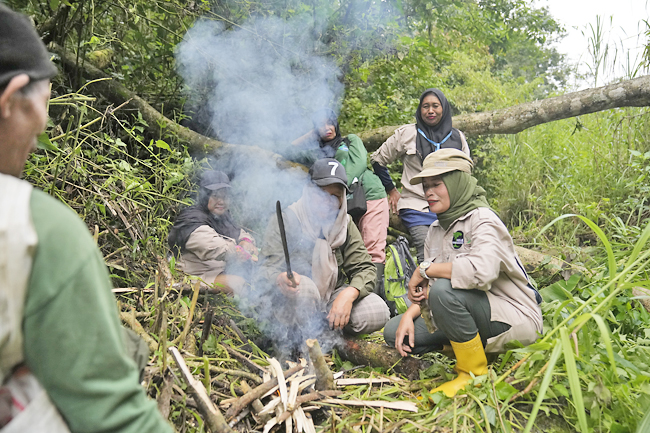
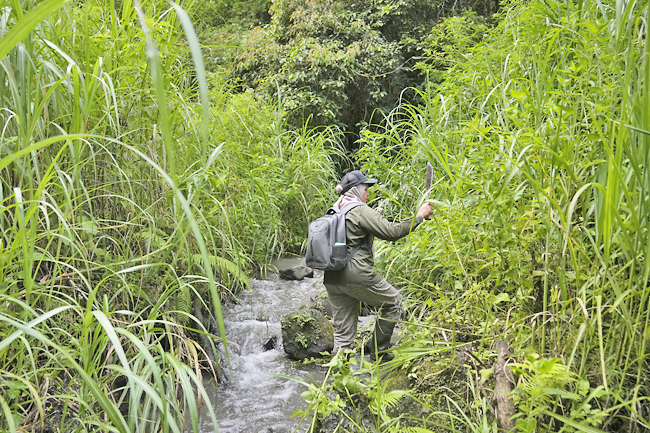
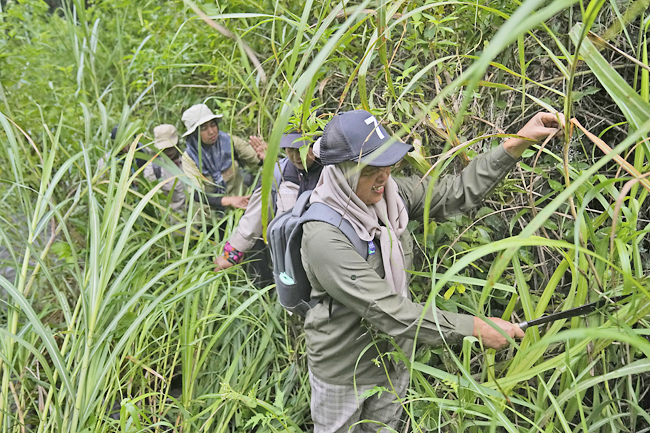
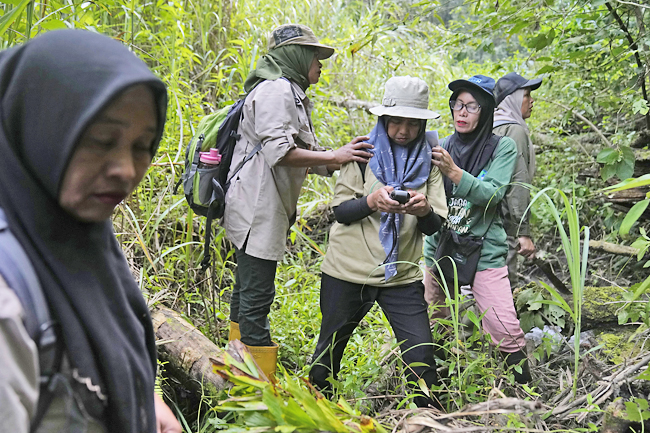
In Damaran Baru, which borders one of the richest expanses of tropical rainforest in Southeast Asia, many villagers rely on the forest for their livelihoods.
Farmers harvest coffee from mountainside shrubs and the water flowing from the mountainside provides water for drinking and cooking in the village.
But unregulated deforestation from irresponsible farming practices and abuse of forest resources have led to disastrous consequences, said villager Sumini, who like many Indonesians uses only one name.
In 2015, torrential rains spurred flash floods in the village, forcing hundreds to evacuate. When the water receded, Sumini went to the forest and saw that the village’s tree-filled watershed had been illegally cut.
“I looked at it and thought, ‘This is what caused the landslides and disaster,'” Sumini said in an interview.
Her next thought was what spurred the creation of the woman-led patrol: “As a woman, what do we want to do? Do we have to be silent? Or can we not get involved?”
Indonesia has rangers in its national parks, and a patchwork of watch groups elsewhere, including some Indigenous groups. But Sumini’s idea was new.
After lobbying women in the village to start a patrol, Sumini was met with pushback in the traditionally patriarchal province.
But after persuading village leaders and husbands of women interested – including allowing men to accompany them on the patrol – Sumini was granted permission to start the group.
Sumini began working with the Forest, Nature and Environment Aceh Foundation to help legally register the patrol group with a social forestry permit – formalised, government-supported permission that allows local communities to manage their forests.
After the permit was processed, the foundation began teaching the rangers-to-be standardised methods of forest conservation, said foundation chairperson Farwiza Farhan.
The first training, she said, was learning how to read a map and teaching other standardised methods of forestry, such as recognising wildlife markings and using GPS.
“The way outsiders navigate around the forest is very different than how the local communities do. They know it, but it’s not necessarily translated into a standardised language that we use, like maps and GPS,” said Farhan.
“Finding and creating that space where we speak the same language when talking about the forest was key.”
In January 2020, the group had their first official patrol. Since then, their monthly treks through the jungle have include mapping and monitoring tree coverage, cataloguing endemic plants and working with farmers to replant trees.
They periodically measure individual trees and mark their locations, tagging them with ribbons warning against cutting them. When they spot someone in the forest, they remind them of the jungle’s importance for their village and give them seeds to plant.
Sumini said the low-key tactics the women use, rather than brusque confrontation, have been effective in getting people to change their habits. They carry no weapons, apart from large blades they use to cut their way through the forest when needed, but expressed little fear for their own safety.
Violence in the jungle is almost unheard of, and the rangers typically outnumber those they meet. The women don’t have the power to arrest people, but can report them to authorities.
Even before the forest patrols started, some women in the group were already trying their gentle diplomacy at home.
For years, Muhammad Saleh, 50, would light parts of the forest on fire, hunting tigers he could kill and sell to help feed his family.
The then-raging civil war had hurt the local economy, and each tiger would fetch him about USD1,250. Other days he’d cut down trees for firewood or trap birds that could be sold at the market.
His wife, Rosita, 44, pleaded with him not to go. She reminded him about the animals that would be affected by his actions.
It took years, but eventually Saleh felt the message of his wife. He stopped poaching and cutting down trees and began joining his wife on patrols of the forest.
He said he’s seen the improvement since he began patrols: the forest has more birds and tree cover is denser.
“Our forest is no longer deforested: the animals are awake and we’re more awake,” he said. “The whole world feels the impact, not just us.”




